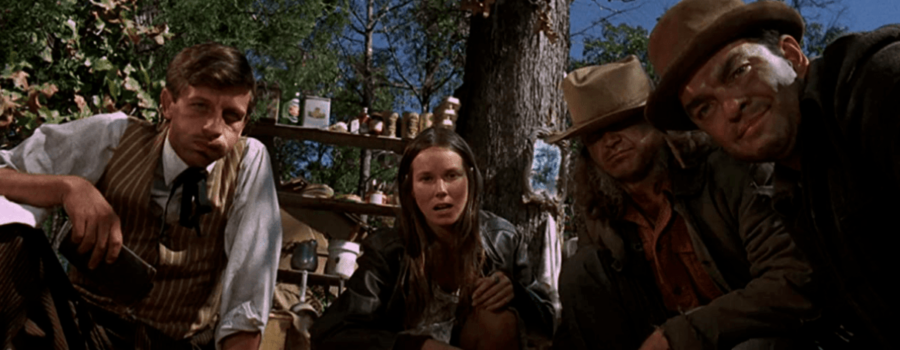[Published at Awards Watch] 1972’s Boxcar Bertha is an often overlooked, critically debated entry into Martin Scorsese’s filmography, mostly because it is a departure from his usual themes and visual style that we, as an audience, have grown accustomed to over the years. It was an overall risk for the young director, one that fellow filmmakers even scolded. Still, it remains a gangster movie, albeit an unorthodox, Marxist one. Yet Boxcar Bertha was Scorsese’s ode to his Italian Neorealism predecessors, even if the director had to try to work outside of a Hollywood system to do so. It remains a gangster film he didn’t revisit, spiritually, until much later in his career. He would expound upon the leftist themes present in Boxcar Bertha in his last film, The Irishman, however, largely abandoning the leftist themes present in his sophomore feature (with the marriage of Mafia and Marxism a small subtext in the larger biographical story of Frank Sheeran). The film about the fictional Bertha Thompson (Barbara Hershey) remains a largely standalone, and standout film often disregarded when compared to his other acclaimed films.
Not only did Boxcar Bertha embrace the communist ideologies of the Neorealist filmmakers, but it also introduced the world to Scorsese’s signature fascination with cinematic violence, which became more prevalent in his next film, Mean Streets, and present, in general, throughout his filmography.
Virtually every Italian Neorealism film focused on the working-class struggle – blue-collar men and women working long hours to barely support their struggling families. Films like Paisà and Ladri di biciclette (Bicycle Thieves, 1948) not only showed the effects of a changing economy from worker-run to capitalist, but it also highlighted an uneven wealth distribution and the importance of unions as a means for the working class to survive on a livable wage. Boxcar Bertha was no different.
The film is a fictionalized account of Bertha Thompson (although, at the time, even Scorsese initially thought it was an autobiography due to the semi-eponymous book upon which it was based), a Great Depression drifter who joins in cahoots with railway laborer and union leader and spokesman “Big” Bill Shelly (David Carradine) and two other working-class men, Rake Brown (Barry Primus) and Von Morton (Bernie Casey). The four of them become extremists in trying to force unions to establish workers’ rights, revolting against the anti-union railroad tycoons to the point of murder and train-robbery. Ultimately, Shelly, who’s referred to as a “Bolshevik,” furthering a theme of exploiting false American propaganda about communism, is killed, as the gang does their best to force better values upon the working class in a capitalist society. Just like Scorsese learned when working on this film, it isn’t easy trying to spread an unpopular opinion or work to the tune of your own horn within a rigid system; producer Roger Corman would damper Scorsese’s vision by forcing him to insert unnecessary chase scenes and nudity. Ultimately, Scorsese was able to keep his scenes of filled with a plethora of violence, including Shelly’s brutal death.
However, perhaps fellow filmmaker John Cassavetes is the largest villain in the Boxcar Bertha story. After seeing an early cut of the film, Cassavetes famously told Scorsese, “Marty, you’ve just spent a whole year of your life making a piece of shit. It’s a good picture, but you’re better than the kind of people who make this kind of movie.” It greatly affected Scorsese, which is likely why he didn’t revisit anything like the Marxist anthem for decades to come.
Many of Roberto Rossellini, Luchino Vischonti, and Vittoria De Sica, and other voices of the genre’s films were funded by the communist party. Readers conditioned to the U.S.’s vilification of communism may instantly think of Lenin and Stalin’s dictatorships, but the communism in World War II Italy was a more idealistically pure form of communism – one more aligned with Marxist theories. The communist party in Italy strengthened after Mussolini’s fascist regime ended post-WWII. It was considered the more liberal party. One with Partisans fighting along with The Allies to defeat the Nazis. One that funded the arts and didn’t censor its films. Boxcar Bertha takes the rebellious, censorship-free spirit of that time and runs with it. However, capitalism in practice slows it down to a walk, with corporate greed representative of the realistic nature of the worker trying – and often failing – to implement “radical” change in a society excessively stuck in its ways; today, Western society implements a dangerous hierarchy counterintuitive of unions. Whereas Boxcar Bertha glorifies the essence of unions and their Marxist ideologies – workers’ rights – the reality of capitalism sheds light on the corruption of these organizations and how any Marxist institution can be ruined in the hands of a selfish, wealthy few.
One wonders if the filmmakers of the Neorealism era would have ever predicted that capitalism would become a hegemony so strong that the people living under it are interpellated to the point of not even questioning a better way of life. Some may consider us in a post-capitalist era. Some may even consider us in a societal interregnum. However, Western thought is as dominant as ever. Even when unions were finally established for workers, demands were incremental. The book on which the film is based upon, “Sister of the Road: The Autobiography of Boxcar Bertha,” was written by Ben Reitman, an anarchist whose wife, Emma Goldman, was also a famous anarchist and political activist. Goldman believed anarchy was the key to a revolution overthrowing capitalism – a system that dehumanized its workers. The only solution to this was to transfer the means of production from the hands of the few to the hands of all – the proletariat, and even the lumpenproletariat – or the underclass.
Even Karl Marx believed that socialism was the first transition point in the stages that would have to occur in reality in order for this transition of power to happen, ultimately shifting our society from capitalism to communism – the ideal stage in which workers controlled everything and there was no uneven distribution wealth. Anarchism, which Marx largely refuted throughout his lifetime, would have abolished the State altogether, most likely by revolutionary force – like Bertha and the gang, who almost seemed to want to skip the first two phases of socialism and communism. Were they educated in Marxist theory, perhaps their methods of trying to implement change among the railroad workers would have been less extreme. In a speech Goldman made during her lifetime, a lone worker confronted her, marking the impetus of her walking back some of her radicalism – she realized that revolution was simply not a realistic event in our lifetimes, something even the vast majority of leftist political leaders today understand – allowing her to create space between her views and the reality of Western society, creating empathy towards workers’ plights.
Goldman discussed the exchange in her autobiography, Living My Life: “He said that he understood my impatience with such small demands as a few hours less a day, or a few dollars more a week. It was legitimate for young people to take time lightly. But what were men of his age to do? They were not likely to live to see the ultimate overthrow of the capitalist system. Were they also to forgo the release of perhaps two hours a day from the hated work? That was all they could hope to see realized in their lifetime. Should they deny themselves even that small achievement? Should they never have a little more time for reading or being out in the open? Why not be fair to people chained to the block?”
The characters in Boxcar Bertha desperately wanted more for the worker in the United States, like Goldman, but all-too-often over the past 50 years, workers are content with minimal change, even if it means – oftentimes unwittingly to them, keeping the men and women in charge wealthy. This could also be seen as a realization that an anarchist attempt at an uprising is not sustainable in a society in which capitalism is revered like a religion. And this realization remains a testament to the importance and timelessness of that film about railway laborers that Cassavetes was so quick to dismiss. We could all use more films like Boxcar Bertha in a time where workers still have to go on strike every day across the country due to horrible working conditions, abusive bosses, and unlivable wages.
Boxcar Bertha was released on June 14, 1972 by American International Pictures and is available to rent on Amazon Prime Video, YouTube, Apple TV and wherever you stream films.





![Willem Dafoe on ‘My Hindu Friend’ and Working With Martin Scorsese, Wes Anderson and Lars Von Trier [Interview]](https://www.makingacinephile.com/wp-content/uploads/2020/01/5C28B7CD-976D-47F4-8BF3-7A1413B51EEF-300x200.jpeg)


Leave a Reply
Your email is safe with us.